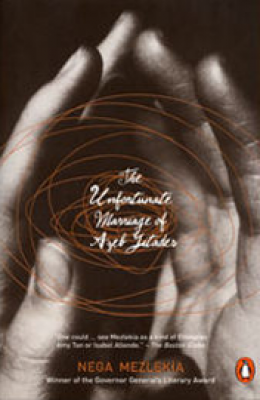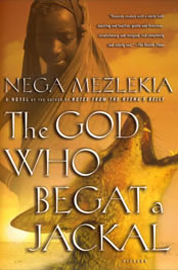Nega Mezlekia's Books

The Unfortunate Marriage of Azeb Yitades
Spanning events from the 1960s to 1990s, The Unfortunate Marriage of Azeb Yitades is an epic tale of a small village in eastern Ethiopia struggling to maintain its diversity and heritage as the modern world encroaches on its isolation.
Aba Yitades, the local priest, takes this challenge very personally. The father of three daughters, he is always alert to the new temptations they face – and all the more so when the arrival of a family of American missionaries threatens to put an end to the community’s most treasured traditions.
Steeped in the rich and unique culture of the Ethiopian highlands, this story of a village’s reluctant but inevitable modernization – and one woman’s tragic downfall – is told with Nega Mezlekia’s customary wit and charm.
“The publicity bumph for Ethiopian-born Nega Mezlekia’s second novel places him in the company of Gabriel GarcĂa Márquez and Ben Okri, among others. I would add one more: Rohinton Mistry. Like Mistry, Mezlekia writes in an amused but compassionate voice about characters standing at cultural crossroads, trying to make sense of change.
The Yitades family sits at the heart of the tiny agrarian village of Mechara. Aba Yitades is the parish priest. This is a Christian community, part of the Ethiopian Orthodox Church. One of the novel’s strengths comes from the author’s ability to show how Christianity mingles with rural Ethiopian culture – how place mediates faith, or creates particular religious practice. (This, too, echoes Mistry.)”
- Quill & Quire
“You don’t need to know that the years encountered in The Unfortunate Marriage of Azeb Yitades — beginning in 1961 and concluding in the 1990s — are among the most important in Ethiopia’s modern history. It’s not essential to understand that between the opening pages of Nega Mezlekia’s second novel and its conclusion, Ethiopia went through radical changes, including a revolution that occurred in 1974 that left the beleaguered country no better off than it had been before. You don’t need to understand the political ramifications of anything you come across in this book, nor do you need to grasp the manipulations that were occurring in the country that makes up most of the horn of Africa and that is surrounded by Eritrea, Djibouti, Kenya, Somalia and Sudan.
You don’t need to know because, like the very best of stories, The Unfortunate Marriage of Azeb Yitades works softly and on its own merits without any of the wider backstory. Readers with a working knowledge of modern African history will come away from The Unfortunate Marriage of Azeb Yitades with a different, perhaps fuller, understanding. But even without any of that, it’s a starkly human tale that works on many levels and would be equally compelling against many backdrops.
… Mezlekia’s style is gentle, even charming. He seems to tell his tale starkly, and without embellishment — almost like a village storyteller — but this simplicity is deceptive. There is more going on here — always — than what at first meets the eye.
… Mezlekia tells his story with wit and insight, he engages deeply and leaves you feeling richer for the experience. It’s the story of a country and a young woman coming painfully to adulthood: the story of modern Ethiopia and, somehow, the universal story of childhood lost that we’d recognize no matter where it was set.”
- January magazine

